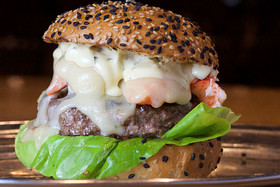
The meatless movement is prompting some restaurants to beef up their offerings.
Beyond Meat BYND, -12.32% — the plant-based substitute that looks, tastes and bleeds like real meat in the form of burgers, sausages, beef crumbles and taco filling — has sprouted up at some of the country’s biggest restaurant chains and retailers from Dunkin’ DNKN, -0.28% to Whole Foods AMZN, -0.73%.
Beyond Meat went public in May with the biggest IPO since 2008, but some restaurant chains aren’t sold on the alternative protein.
Beyond Meat went public in May with the biggest IPO since 2008, but some restaurant chains aren’t sold on the alternative protein.
Chipotle CMG, -0.47% says plant-based meat like Beyond Meat and its competitor Impossible Foods are too processed for its menu.
When asked if the chain would consider adding a plant-based meat to restaurants, Chipotle CEO Brian Niccol told Yahoo Finance: “We have spoken to those folks and, unfortunately, it wouldn’t fit in our ‘food with integrity’ principals because of the processing, as I understand it, that it takes to make a plant taste like a burger.”
And last month Arby’s, the Ohio-based chain known for its roast beef sandwiches, appeared to be trolling the meatless movement and using it as a platform to publicize new offerings for carnivorous diners with the launch of the “Marrot,” a fake carrot made entirely out of meat. Arby’s dubbed it the world’s first “meat vegetable.” The chain said the Marrot is made with 100% turkey breast and a carrot marinade made from dried carrot juice powder. It’s said to contain 30 grams of protein.
Some chefs are proceeding with caution by not jumping on the alternative meat bandwagon and serving something they haven’t prepared themselves.
“We thought about it, but we’re sticking with our [meat] burgers and lobster,” Danny Lee, the executive chef of Burger & Lobster, a London-based restaurant with locations in New York City, told MarketWatch.
Plant-based faux meat can be attractive for consumers looking to cut down on red-meat consumption, but nutritionists say alternatives to meats aren’t always much healthier, and sometimes meat eaters may even be better off ordering the real thing.
“Are they healthier as far as sodium, calories and fat content? Definitely not,” Sharon Zarabi, a registered dietitian and bariatric program director at Lenox Hill Hospital, told MarketWatch in June.
At Burger King QSR, -1.88%, for example, the meatless Impossible Whopper, available at select locations, is 630 calories, compared to the regular Whopper, which is 660. (The Impossible Whopper is made with soy protein, potato protein, coconut oil, sunflower oil and heme, a molecule that makes it look and bleed like real meat).
Both have around the same amount of fat (34 grams of fat, and 11 grams of saturated fat for the Impossible Whopper; and 40 grams of fat, and 12 grams of saturated fat for the Whopper). The meatless version has 1,240 milligrams of sodium verses 980 for the meaty one.
Beyond Meat and Impossible Foods did not immediately return a request for comment.
Consumers are also paying more for the meatless version: $5.19 for the Impossible Whopper and $4.19 for the regular Whopper.
Zarabi says processed foods, whether they’re meatless or meat-containing, are never the healthiest choice. Processed food has been associated with a higher cancer risk, a study published in the British Medical Journal last year found. People who had a 10% higher intake of ultra-processed foods — typically foods that are higher in fat, saturated fat and added sugar and sodium — had more than a 10% increase risk of cancers, the study, published in the British Medical Journal last year, found.
Not all restaurants are offering faux meat alternatives
Some restaurants are turning their noses up at offerings such as those from Beyond Meat. Shake Shack’s SHAK, +1.79% CEO Randy Garutti told CNBC in June it had no plans to put out a plant-based product.
But others have participated in the meatless trend. Dunkin announced last week it would become the “first U.S. restaurant chain to sell 100% plant-based Beyond Breakfast Sausage.”
Some 95% of people who purchased a plant-based burger this year also ate meat.
Burger King, White Castle, Red Robin RRGB, -1.24% and Del Taco have also started offering menu items made with plant-based meats. And McDonald’s MCD, -1.23% has also been rumored to break into the alternative meat market.
Meat-eating consumers appear open to trying alternative proteins. Some 95% of people who purchased a plant-based burger this year also ate meat, new data from market researcher NPD Group shows.
What’s more, there were 228 million servings of plant-based burgers at quick service restaurants this year, up 10% from a year ago. And while beef burgers are still the most popular burger on menus with 6.4 billion ordered, growth is flat compared to a year ago, according to the same report.
Some restaurants are betting on diehard carnivores. Burger & Lobster recently beefed up its brunch menu with a Lobster Steak & Eggs item consisting of an 8-ounce Flatiron Steak and a 1.25-pound lobster served alongside two eggs and potato hash.
Lee, Burger & Lobster’s executive chef, noted that his restaurant sells a mushroom burger for vegetarian clients. However, he said there’s not enough demand for meat alternatives, and he feels it’s still unclear whether alternative meat products that mimic meat will be a fleeting or lasting trend.
“If you’re going to make a plant burger bleed,” he said, “why not just have a regular burger with simple ingredients done well?”











